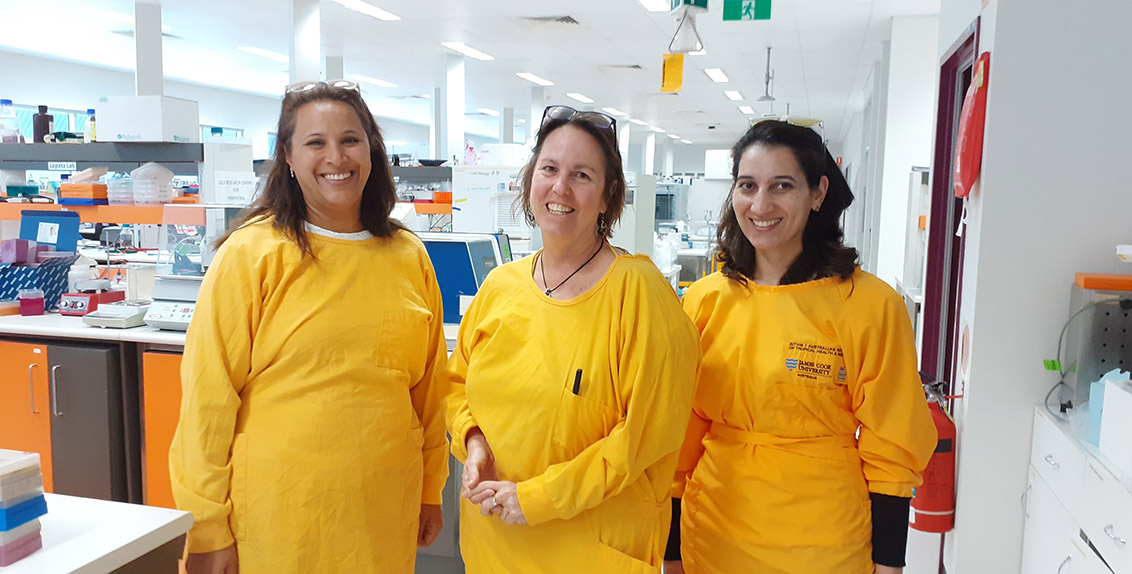News & Events
AWLA fellows learn innovative agricultural research practices in Australia
Two of the Arab Women Leaders in Agriculture (AWLA) fellows have recently concluded a study tour of Australia. They were selected from the AWLA’s inaugural cohort, which includes 22 women scientists from Algeria, Egypt, Jordan, Lebanon, Morocco and Tunisia.
Supported by the Council for Australian-Arab Relations (CAAR), the fellows attended the International Tropical Agriculture (TropAg) Conference in Brisbane on 11-13 November 2019 and visited James Cook University (JCU), a public university in North Queensland.
During the tour, the fellows had an opportunity to learn first-hand about agricultural research and development in Australia, make new contacts and improve their technical and leadership skills.
Dr. Inès Ellouze, Assistant Professor at the Higher Institute of Biotechnology of Beja, Tunisia, and Dr. Samia Oueslati, Assistant Professor at the Laboratory of Extremophile Plants (LPE), the Center of Biotechnology of Borj Cedria (CBBC), Tunisia, also learnt about the latest innovations in agriculture in Australia and other countries, which could be adapted and adopted in the Middle East and North Africa (MENA) region.
Speaking of her experience, Dr. Inès Ellouze said: "During the TropAg Conference, I was surprised to learn that most of the farmers' problems are almost the same as I have encountered in my country. Most of the problems associated with smallholder farmers include water shortage, economic difficulties, labor management, and difficulty in selling their harvest. Interactions with scientists from various disciplines allowed me to gain multiple perspectives on research. To build an information-driven framework, I think the multidisciplinary communication among researchers, agronomists, farmers, breeders and nutritionists is crucial."
"While taking part in the study tour at JCU, I was so happy to discover a variety of research areas and high-tech equipment in the laboratories. I also got an opportunity to meet internationally recognized researchers that showed openness to collaborate with us, and other AWLA fellows," added Dr. Inès Ellouze.
For her part, Dr. Samia Oueslati commented: "The opportunity to visit Australia to attend the TropAg Conference and tour JCU gave me several advantages. It was a great experience that stimulated my motivation, courage, self-confidence, and, above all else, communication skills. It allowed me to learn about tropical agriculture based on new strategies; for example, new irrigation systems and new trends to overcome climate-change-related issues such as drought and heat. Moreover, I was able to network with renowned experts and researchers who shared with me ideas and approaches that are beneficial to my professional career and I will pass on to other colleagues. All these new strategies can be applied in our country and the MENA region. This will help us to overcome agriculture-related problems and improve the quality and impact of agricultural research, resulting in better solutions to the region's most pressing challenges."
Dr. Samia Oueslati added: "The visit to JCU was a value-added opportunity that allowed me to build up new contacts in various fields. Also, meetings with JCU staff and visits to the laboratories helped me to improve my knowledge as well as discover new techniques used in scientific research."
Led by the International Center for Biosaline Agriculture (ICBA), AWLA is a leadership program aimed at empowering women researchers who can make a positive impact in their workplaces, communities and countries.
The program is designed to bring together women researchers from different countries in the MENA region to spearhead positive changes in agriculture while addressing the challenges they face in their careers.
AWLA is funded by the Bill & Melinda Gates Foundation, the Islamic Development Bank (IsDB) and the CGIAR Research Program on Wheat.
AWLA contributes towards the achievement of the United Nations Sustainable Development Goals on Gender Equality (SDG 5), Climate Action (SDG 13), Life on Land (SDG 15), and Partnerships for the Goals (SDG 17).

